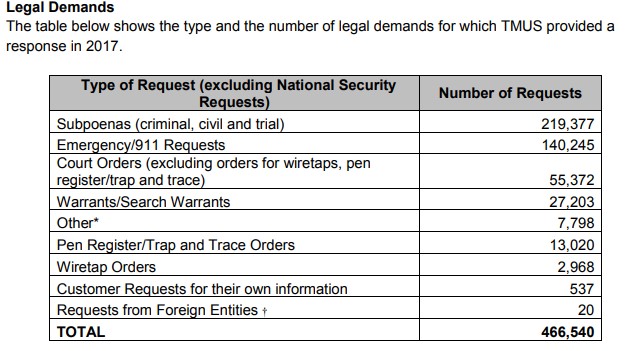It's a long-running open secret that governments demand that commercial entities disclose data about their customers in connection with criminal investigations, regulatory enforcement and issues of national security.
At least three developments led to governments obsession with having “systematic access” to personal data: Terrorism, taxation and the general allure of ‘Big Data’.
In other words, if big businesses are collecting and analyzing massive sets of data, governments aren’t going to be left behind in this information gold mine. Data is the ultimate weapon of the 21st Century.
So as data begins to pile up, government demands on providers become more frequent.
Case in point: Last week, telecommunications giant T-Mobile--which has 77 million users as of its Q2 reporting--published its 2017 transparency report--revealing a 12-percent increase in the number of overall data demands it responded to compared to 2016.
Notably, the report said the company responded to 219,377 subpoenas, an 11-percent rise over 2017. The demands came from federal agencies who can ask and obtain without judicial oversight.
T-Mobile also responded to 55,372 court orders (up 13 percent) and 27,203 warrants (up 19 percent). Additionally, it received 46,395 requests to track customers’ real-time location, and 4,855 warrants and orders for tower dumps, which police can use to obtain information on all the nearby devices connected to a cell tower during a particular period of time. Related: Bitmain’s IPO Is Not Looking So Hot Right Now
The number of national security requests received declined during 2017.

(Click to enlarge)
According to spokesperson for T-Mobile, these figures reflect a “typical increase of legal demands across the board” and that the increases are “consistent with past years.”

(Click to enlarge)
And telecoms companies are obligated to cooperate, but they’re also under pressure to protect the personal data of their customers, and these two worlds are having a tough time existing in the same reality.
That’s where the annual reports come in, detailing “systematic access and government requests”. And they’ve become the norm since the explosive disclosures of former National Security Agency contractor Edward Snowden in 2013 lifting the veil of mass-surveillance conducted by the NSA.
Related: Is This What Has Kept Gold Prices Low?
A June report from The Intercept also claims to shed light on AT&T’s alleged collaboration with the government. According to the Intercept, eight facilities in the United States have been identified as hubs for AT&T’s efforts to collaborate with intelligence agencies. The report described these hubs as the “backbone” of direct access to raw data for the NSA in an operation allegedly codenamed “Fairview”—none of which is likely to be the subject of any public company transparency report along the lines of T-Mobile’s.
In the meantime, the government is driven toward the collection of more and bigger data than ever.
The NSA collected 534 million records of phone calls and text messages of Americans in 2017, according to Reuters. That’s more than triple what they collected in 2016. Other surveillance methods have also seen an uptick on collections.
By Damir Kaletovic for Safehaven.com
More Top Reads From Safehaven.com
















